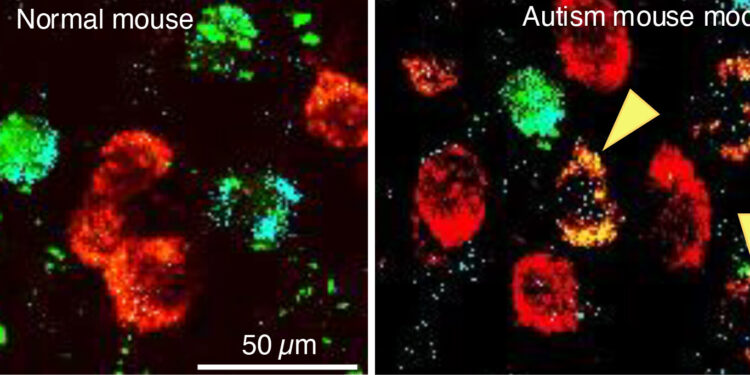Neurotransmitter Switch: Mouse models highlight excitatory neurons (red blood cells) that express the neurotransmitter glutamate while inhibitory neurons (green cells) express the neurotransmitter GABA. Yellow arrowheads indicate inhibitory neurons that have switched their neurotransmitter from GABA to glutamate. Credit: Spitzer Lab, UC San Diego
Autism spectrum disorders (ASD) involve mild to severe impairment in social, behavioral, and communication skills. These disorders can have significant impacts on performance in school, work, and other areas of life. However, researchers lack knowledge about how these disorders emerge in the early stages of development.
Neurobiologists at the University of California, San Diego, have found evidence of altered nervous system development in mouse models of autism spectrum disorder. They have linked environmentally induced forms of ASD to changes in neurotransmitters, the chemical messengers that allow neurons to communicate with each other. They have also found that manipulating these neurotransmitters early in development can prevent the emergence of autistic-like behaviors.
The study is published in the Proceedings of the National Academy of Sciences.
“In searching for the root causes of autism spectrum disorders in the brain, we have discovered an early change in neurotransmitters that may be the root cause,” said Nicholas Spitzer, professor in the School of Biological Sciences’ Department of Neurobiology and the Kavli Institute for Brain and Mind. “Understanding the early events that trigger ASD could lead to new forms of intervention to prevent these behaviors from occurring.”
ASD diagnoses have increased in recent years, but how these disorders manifest at critical cellular and molecular levels is not well understood.
The study’s lead author, Swetha Godavarthi, an associate scientist on the project, and her colleagues studied neurotransmitter expression in the medial prefrontal cortex, a brain area often affected in people with ASD. They tested the hypothesis that changes in the type of neurotransmitter expressed by neurons in the prefrontal cortex might be responsible for a chemical imbalance that causes ASD-like behaviors.
The study’s lead author, Swetha Godavarthi, an associate project scientist, and her colleagues studied neurotransmitter expression in the medial prefrontal cortex, a brain area often affected in people with ASD. Credit: Erik Jepsen/UC San Diego Communications
Previous studies had shown an increase in the incidence of ASD in children when pregnant women had an increased immune response or were exposed to certain medications during the first trimester (environmental forms of ASD). The researchers replicated ASD in mice by administering these environmental agents to mice in utero.
These agents caused a brief loss of the inhibitory neurotransmitter GABA and a gain of the excitatory neurotransmitter glutamate in neonatal mice. Although this GABA-glutamate transmitter switch spontaneously reversed after a few weeks, adult mice exhibited impaired repetitive grooming behaviors and decreased social interaction. Bypassing this brief early transmitter switch in neonatal mice prevented the development of these autistic-like behaviors in adults.
“GABA expression in neurons that have replaced GABA with glutamate prevents the onset of stereotyped repetitive behaviors and reduced social interaction,” Spitzer said. “These results demonstrate that altered electrical activity and inappropriate excitation of neurons early in development can alter nervous system assembly.”
Alterations in neurotransmitter expression early in development have implications for other behavioral problems later in life, since the rest of the nervous system is then built on a platform of faulty wiring, similar to a house built on an unstable foundation.
“Switching neurotransmitters can alter the assembly of the nervous system and have profound downstream impacts,” Spitzer said.
The researchers say the new findings are consistent with other evidence that altered signaling in the nervous system during early development can lead to negative consequences as the brain matures.
The authors of the article are Hui-quan Li, Marta Pratelli and Nicholas Spitzer.
More information:
Swetha K. Godavarthi et al., Embryonic exposure to environmental factors causes transmitter switching in the neonatal mouse cortex, causing adult autistic-like behavior, Proceedings of the National Academy of Sciences (2024). DOI: 10.1073/pnas.2406928121. doi.org/10.1073/pnas.2406928121
Provided by University of California – San Diego
Quote:Autism spectrum disorders linked to neurotransmitter switching in the brain (2024, August 22) retrieved August 22, 2024 from
This document is subject to copyright. Apart from any fair dealing for the purpose of private study or research, no part may be reproduced without written permission. The content is provided for informational purposes only.



